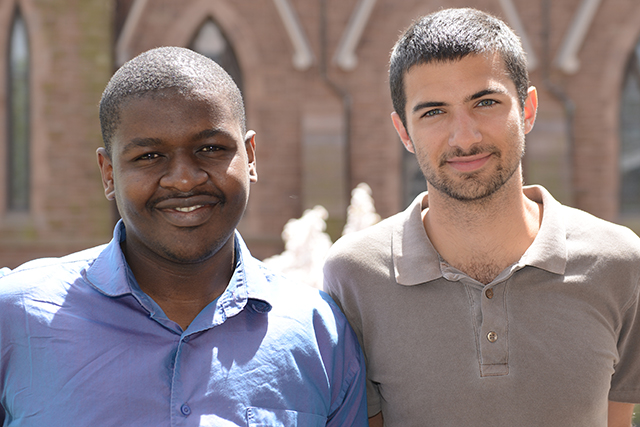2 Students Recipients of Projects for Peace Awards

Two Wesleyan students have been awarded grants through the Davis Projects for Peace Program to bring their grassroots project proposals to fruition. Class of 2014’s Mfundi Makama’s $10,000 grant will support The Buddies Program, which he recently created as a way to empower young women in Swaziland through educational achievement. Greg Shaheen ’13 will use the funds to establish a community-based eco-center focused on environmental education and action for teenagers in Lebanon. The projects will take place this summer.
Student applicants at more than 90 Davis United World College Scholar Program partner schools—including Wesleyan—design grassroots projects that promote peace, build understanding, and address the root causes of conflict. The program is funded by internationalist and philanthropist Kathryn Wasserman Davis, who died earlier this year at the age of 106.
Makama, who is from Swaziland, is double majoring in neuroscience and behavior and molecular biology and biochemistry. Though Swaziland is known as the most peaceful country in Africa, its “culture and tradition relegate women to second-class citizens. Such cultural barriers incite abuse in Swaziland and lead to poor law enforcement,” Makama wrote in his project proposal.
Makama found himself troubled by the Swazi government’s indifference to harassment and sexual assaults against women, and the public’s attitude that some women were “asking for trouble” by wearing short skirts. He believed education was the best way to change these attitudes.
A couple years ago, Makama founded an NGO, Stop Women Assault (SWA), which became a student-run group at the University of Swaziland seeking to raise awareness and start dialogues about sexism in Swaziland through skits. The Projects for Peace grant will support the launch of The Buddies Program: Be a Mentor that Matters, which promotes academic achievement among young women from disadvantaged backgrounds, and helps them gain admission to Swazi universities in order to break the cycle of poverty and encourage self-dependence. Girls in their final year at several rural high schools will be partnered with tutors, who will mentor them and help them prepare for Swaziland’s college entrance exam. Ten to 15 tutors—college students who come from a range of different academic backgrounds—will be hired and paid a stipend. The grant funds will also cover the cost of an opening ceremony for the program; the purchase of stationary and exam papers; and transportation for the girls, including to attend a career fair. The program also will partner with Swaziland’s biggest NGO, the Swaziland Action Group Against Abuse (SWAGAA) to host a one-day anti-abuse workshop.
Makama is a firm believer in the power of mentorship for young people. Growing up, his mother was a strong mentor to him. “She forced me to school and made me believe in education. That kept me going,” he said.
In the future, Makama hopes to expand the program to include boys as well. After he graduates from Wesleyan, he plans to earn master’s degrees in public health and business in either the U.S. or the U.K., and eventually to return to Swaziland.
Shaheen, an earth and environmental sciences major with a certificate in Middle Eastern Studies, will travel to Lebanon on his Project for Peace, titled, “Community-Based Eco-Center and Environmental Summer Workshops.” Though his grandfather is Lebanese-American, Shaheen didn’t visit the country until his junior year at Wesleyan, when he studied abroad there. His family came to visit over Christmas break, and together they drove to a village in the northern Akkar region of Lebanon from which they believed their ancestors came. There, they met their large extended family for the first time. “That made me feel even more connected to that heritage,” Shaheen said.
The Akkar region, which Shaheen described as poor and neglected, is religiously and ethnically diverse. Through conversations with people in the region, Shaheen found that there are still barriers to close relationships and mutual understanding between different Christian and Muslim villages—a remnant of the Lebanese Civil War. On their trip, Shaheen’s family explored an area deep in the mountains, and was taken on a hike by a man who is a regional guide.
“I noticed the poverty in the region—which is largely a result of neglect by the dysfunctional and corrupt Lebanese government—and also the startling beauty of the landscapes and the people’s hospitable spirit,” Shaheen said. “I learned about an organization of environmentally-minded people, called Baldaty Biaty (My Village, My Environment), that conducts environmental education and reforestation in the area.” Shaheen kept in touch with his contacts at Baldaty Biaty after returning to Wesleyan, and together they developed the idea behind his Project for Peace proposal: renovating a primitive stone building in the mountains as an eco-center for environmental education and action. The center would serve eco-tourists visiting the area, as well as school groups, and bring together Lebanese people of different sects.
“The idea is to bring together different people in Lebanon around their common natural and cultural heritage,” Shaheen explained. He also hopes to introduce local youth to “opportunities to make a living off the land, and sustainably utilize their resources,” by pursuing work such as small-scale agriculture and bee keeping, and expose them to the growing market for such products in Lebanon.
The grant money will be used to furnish the property with Bedouin tents, install a water network from a nearby spring, and construct a basic kitchen and bathroom. All renovations will be as green as possible, Shaheen said, adding that he hopes to consult with friends at Wesleyan who are more knowledgeable than he is in this area. The grant also will fund workshops for Lebanese teenagers, featuring lectures by professors on topics such as geology and environmental science. Shaheen also hopes to rent rock climbing equipment to enhance the geology lectures.
After graduating, Shaheen may stay in Lebanon. He also plans to spend time in Palestine, “doing my best to help the Palestinians resist the environmental and human crimes being committed there.”
#THISISWHY

